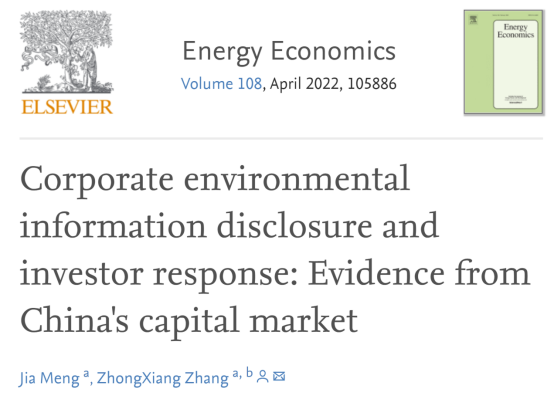发布日期:2022-02-25

天津大学马寅初经济学院卓越教授张中祥院长与其指导的博士生孟佳合作的文章“企业环境信息披露与投资者反应:基于中国资本市场的经验证据”(Corporate Environmental Information Disclosure and Investor Response: Empirical Evidence from China's Capital Market)在Elsevier出版社出版的Energy Economics发表,收录在该刊卷108,文章编号105886。据2020年JCR影响因子报告,Energy Economics的影响因子为7.042,位列SSCI经济学学科类376种期刊第12位。
近年来,企业的环境行为已经成为影响投资者投资决策的重要因素之一。然而,中国上市公司环境信息披露制度的建立时间相对较晚,部分企业仍未重视到环境信息披露的重要性。此外,在当前能源过度消耗和环境问题日益严峻的背景下,中国提出实现碳达峰碳中和的双碳战略目标,这意味着企业将面临更加严格的环境约束和更高的环境成本。当前的研究更多的从具体环境信息披露事件的角度出发,研究企业环境信息披露时间对投资者的影响,样本量相对不足;并且由于企业的环境信息报告大多与年度报告同时发布,部分研究并未排除企业年度报告披露的影响。
针对上述问题,本文以中国2004年至2020年披露环境责任报告和年度报告的上市公司为研究样本,将仅进行年度报告披露的企业作为控制组,研究环境信息披露对资本市场中投资者的影响。本文的边际贡献主要在于:(1)本文收集了中国2004年至2020年间共34658个信息披露事件。具体而言,本文共得到505家上市公司披露的3189个环境信息披露事件和31460个年度报告披露事件,相对全面的数据集能够帮助我们得到比较具有说服力的结论;(2)本文将披露年度报告的企业作为控制组样本,排除了年度报告的披露对投资者带来的影响,并在模型中控制了企业环境信息和年度报告披露时间所带来的影响;(3)本文从投资者的角度对企业环境信息披露的影响进行分析,并使用五因子模型对投资者影响进行了衡量。
基于上述讨论,本文发现,在排除企业年度报告披露的影响下,企业环境信息披露会带来更低的市场回报,即更加负面的投资者反应。通过对企业特征进行分类研究,本文发现机构投资者持股比例较高的企业和重污染行业企业披露环境信息所带来的负面反应更加明显,并且环境信息披露所带来的负面影响在2012年环境空气质量标准修订之后更加明显。本文通过进一步研究发现,昂贵的环境支出和严格的环境监管会加重企业环境信息披露的负面影响,而企业所获得的政府补助能够缓解环境信息披露所带来的负面影响。
本文的结论表明,由于高昂的环境成本和严格的环境监管,企业的环境行为所带来的“环境风险”会使得投资者倾向于将这类企业排除在其投资组合之外,导致企业缺乏主动、真实披露环境信息的动机。因此,政府部门应该继续制定和完善环境信息强制披露制度,并对从事环境行为的企业提供资金支持和政策倾斜,引导投资者逐渐意识到绿色企业的长期效益。
Corporate environmental information disclosure and investor response:
Evidence from China’s capital market
Energy Economics,Volume 108, April 2022, 105886
Jia Meng,ZhongXiang Zhang
Abstract
This paper aims at analyzing the impact of corporate environmental information disclosure from the perspective of investors. To that end, we have collected environmental information disclosure data of all Chinese listed companies from 2004 to 2020 and controlled the impacts of annual reports on investor response. We apply the Fama-French five-factor model to calculate the accumulative abnormal returns of stocks during the event window period. Our results suggest that environmental information disclosure can have a significant negative response among investors when we take the impacts of annual reports into consideration. Moreover, we find that heavy-polluting companies and companies with high institutional shareholding aremore likely to have negative reactions from investors. Notably, the negative response is found significant after the Ambient Air Quality Standard was revised in 2012. Furthermore, high environmental expenditure and strict environmental regulation will result in negative investor responses, while the political connection can alleviate the negative impacts of environmental information disclosure. The results remain robust in different ways. The findings suggest that listed companies may lack the incentive to engage in environmental management and are reluctant to disclose environmental information. Consequently, the government should formulate a mandatory disclosure policy and provide administrative support to environmental-friendly companies. Besides, companies should improve innovation technology to cut down environmental costs. Meanwhile, investors should be aware of the importance of corporate environmental behaviors and realize the long-term benefits of environmental management of listed companies.
Keywords
Environmental information disclosure, Investor response, Corporate annual reports, Fama-french five-factor model, China’s capital market
文章全文参见链接:
https://authors.elsevier.com/a/1edVCW3fcsQym(2022年4月12日前免费下载)
https://www.sciencedirect.com/science/article/pii/S0140988322000688